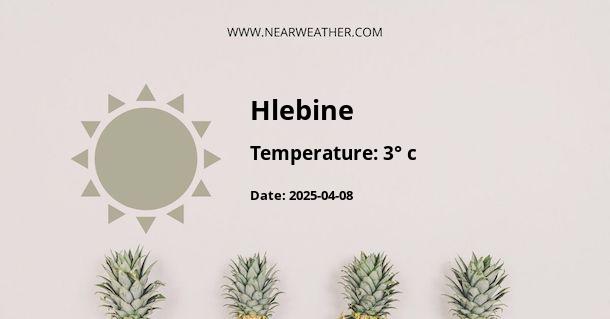Climate Overview of Hlebine, Croatia
In order to understand the climate and weather of Hlebine, a picturesque village in Croatia, it is essential to consider the geographical influences that shape its seasonal patterns. Hlebine is situated in the region of Podravina, near the Drava River, which factors significantly into its climate characteristics. This area experiences a continental climate, typical of inland Croatia, with notable seasonal variations in temperature and precipitation.
Temperature Patterns
The temperature in Hlebine exhibits significant fluctuation throughout the year, reflecting the hallmark traits of a continental climate. Winters are generally cold, while summers are warm to hot.
Winter
- During the winter months, spanning from December to February, temperatures can drop below freezing. Average lows often hover around -3°C (27°F), but colder spells can bring temperatures down further, especially at night.
- Snowfall is common, contributing to the village's picturesque winter landscape. However, snow cover does not typically persist throughout the entire winter season.
Spring
- Spring sees a gradual warming trend, with average daily temperatures rising from about 10°C (50°F) in March to approximately 20°C (68°F) by the end of May.
- Precipitation begins to increase, preparing the land for the lush greenery that colors Hlebine in the summer.
Summer
- June through August marks the summer period, with temperatures often reaching highs above 25°C (77°F), and occasionally exceeding 30°C (86°F) during the hottest days of July and August.
- While summer presents a peak in tourist activity, thanks to the warm and generally pleasant weather, it is also a time when thunderstorms are more frequent, especially in the afternoon.
Autumn
- Autumn brings cooler weather and an increase in precipitation. Average temperatures decrease from around 19°C (66°F) in September to a chilly 8°C (46°F) in November.
- Foliage in Hlebine turns a multitude of colors, making it a beautiful time for visits, despite the onset of the cooler and wetter weather.
Precipitation Patterns
Rainfall in Hlebine is fairly evenly distributed throughout the year, with no distinct dry season, which is characteristic of its humid continental climate.
Annual Precipitation Distribution
| Month | Average Precipitation (mm) |
|---|---|
| January | 45 |
| February | 40 |
| March | 50 |
| April | 60 |
| May | 70 |
| June | 80 |
| July | 70 |
| August | 80 |
| September | 70 |
| October | 80 |
| November | 80 |
| December | 60 |
This table indicates a trend towards higher precipitation during the warmer months, particularly in early summer and autumn, with June and October receiving the highest average rainfall.
Wind and Other Climatic Factors
Hlebine also experiences several wind patterns due to its location in the Podravina region. Among the most notable are the following:
- Bura: A cold and often gusty wind that can cause significant temperature drops, most frequently occurring during winter.
- Jugo: A southeasterly wind bringing damp conditions, generally associated with periods of prolonged precipitation.
Examples of Weather Extremes: Past Climate Event Examples
As with many continental climates, Hlebine is susceptible to weather extremes, which have included severe thunderstorms, flooding, and heat waves.
For instance, in the summer of 2003, a substantial heatwave caused temperatures to soar well above average, impacting not only Hlebine but much of Europe. Similarly, the heavy precipitation in sometimes causes the Drava River to overflow, leading to flooding in the surrounding areas, including Hlebine.
Implications for Travel and Agriculture
Travellers looking to visit Hlebine will find the late spring and early autumn months to be the most desirable, as they offer a balance of pleasant temperatures and reduced tourist crowds. Meanwhile, the continental climate of Hlebine plays a crucial role in its agricultural practices. The warm summers are ideal for growing crops like wheat, corn, and various fruits, whereas the cold winters dictate much of the rhythm of planting and harvest.
Adaptation and Responses to Climate
Local residents in Hlebine and the surrounding areas of Podravina are accustomed to the climate's demands. Buildings are constructed to withstand cold winters, with insulation and heating systems in place, while agricultural practices are adapted to fit the growing seasons determined by the climate patterns.
Long-Term Climate Trends
Likewise, as in other regions worldwide, Hlebine faces the prospect of climate change, which could alter its long-standing weather patterns. Experts are monitoring these trends closely, with particular attention to shifts in temperature averages, precipitation patterns, and extreme weather events. Should these trends continue, they may have implications for local ecosystems, agriculture, and overall lifestyles in Hlebine.
In conclusion, Hlebine's climate is a vivid example of the continental climate type with its own unique characteristics influenced by its geographic location in Croatia. Understanding its seasonal variations helps residents and visitors alike prepare for and make the most of the weather patterns they encounter throughout the year.
A - Hlebine's Latitude is 46.156940 & Longitude is 16.962780.
A - Weather in Hlebine is 8° today.
A - Climate Conditions in Hlebine shows clear sky today.
A - Humidity in Hlebine is 76% today.
A - Wind speed in Hlebine is 9.79 km/h, flowing at 243° wind direction. today.
